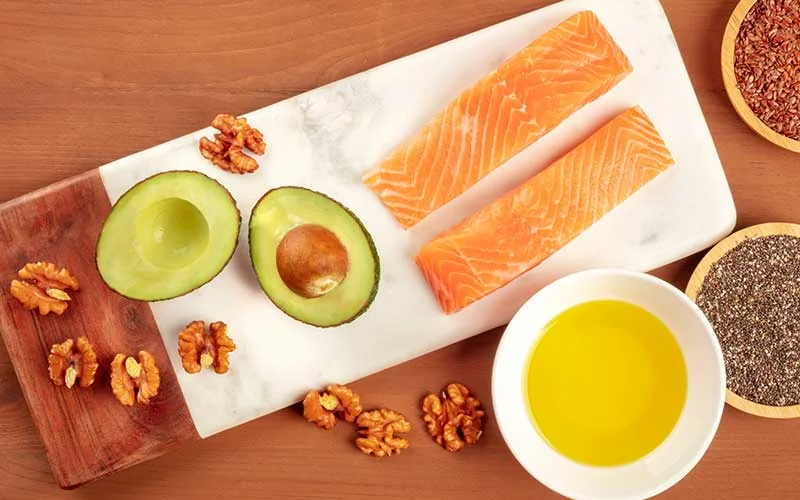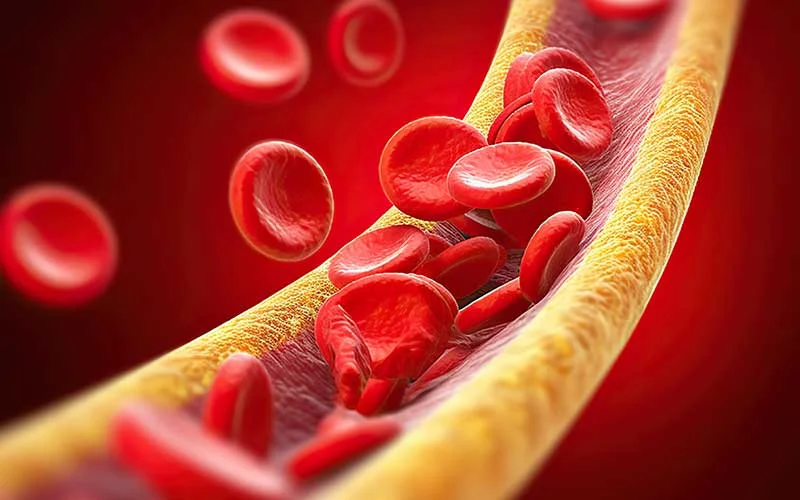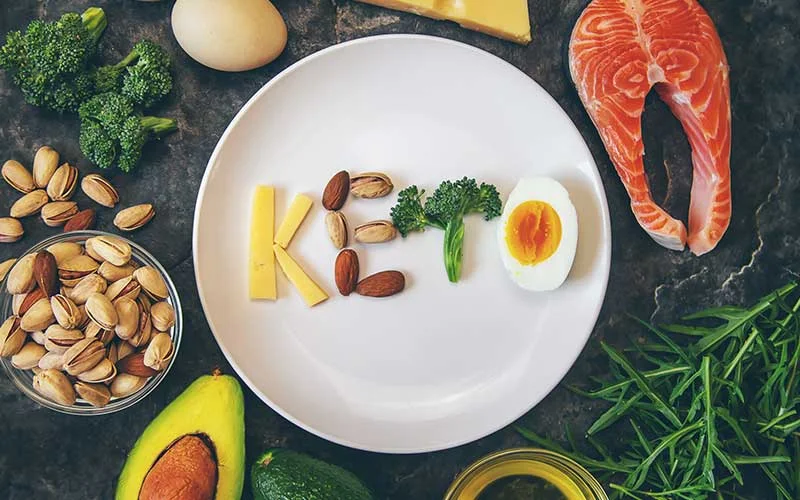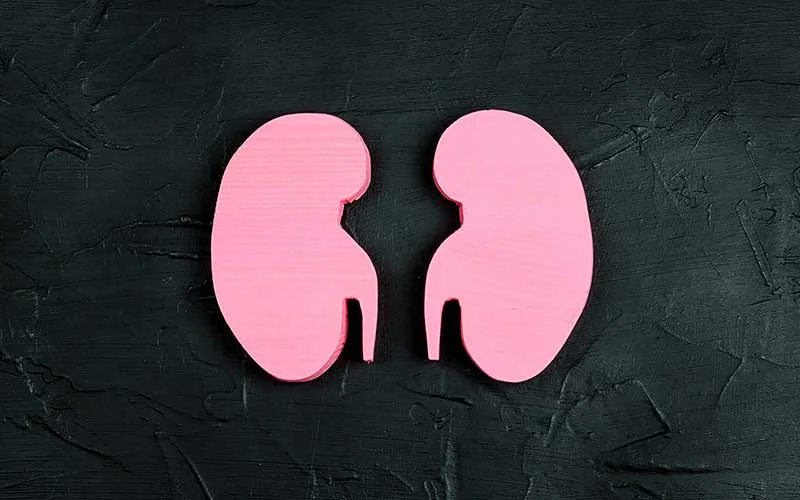The keto diet has become super trendy in the health and wellness community. It promises various benefits, such as weight loss and improved mental clarity. However, like many trends, there are many myths and misconceptions associated with it. In this guide, we will address 11 common myths about the keto diet and provide you with accurate information that will help you make informed choices.
1. Keto and Low-Carb Are the Same Thing

It’s a common misconception that the keto diet is the same as a low-carb diet. While both diets share the fundamental principle of reducing carbohydrate intake, they differ significantly in their macronutrient composition and goals [1].
Keto Diet
- The ketogenic “keto” diet is extremely low in carbohydrates — typically consisting of only 20 to 50 grams of net carbs per day. This drastic reduction in carbs forces the body into a state of ketosis, where it primarily burns fat for energy.
- Keto focuses on high fat intake (approximately 70-75% of daily calories), moderate protein consumption, and very low carb intake.
Low-Carb Diet
- A low-carb diet, on the other hand, is a more flexible approach that reduces but does not necessarily eliminate carbohydrates.
- It allows for a broader range of carbohydrate intake, usually between 50 to 150 grams of net carbs per day.
- Low-carb diets may have different objectives, such as weight management, blood sugar control, or improved overall health.
2. All Fats Are Created Equal

The keto diet does place a strong emphasis on consuming fats, but assuming that all fats are equal is a misconception that can lead to poor dietary choices. To thrive on a ketogenic diet, it’s essential to differentiate between healthy fats and those that should be limited [2].
Healthy Fats (Keto-Friendly):
- Unsaturated fats, such as those found in avocados, olive oil, and nuts, are considered heart-healthy and ideal for a ketogenic diet.
- These fats provide essential fatty acids and are less likely to contribute to heart disease.
Less Healthy Fats (To Be Limited):
- Saturated fats, often found in red meat, butter, and full-fat dairy, should be consumed in moderation on a keto diet.
- Trans fats and hydrogenated oils should be avoided entirely due to their detrimental health effects.
By prioritizing healthy fats and being mindful of less healthy options, you can optimize your keto diet for both health and weight management.
3. Keto Is Only for Weight Loss

While weight loss is one of the well-known benefits of the keto diet, it’s a myth that this is its sole purpose. The keto diet offers a broader spectrum of advantages beyond shedding pounds, such as its positive effects on building muscle [3]. Other benefits include:
Mental Clarity: Many individuals report improved mental focus and reduced brain fog when in ketosis, making the diet appealing for cognitive enhancement.
Stabilized Blood Sugar: Keto can help stabilize blood sugar levels, making it a valuable dietary approach for people with diabetes or insulin resistance.
Energy Levels: By using fat as the primary energy source, keto dieters often experience sustained energy throughout the day.
Understanding that keto offers a range of potential benefits can help you make a more informed decision about whether it aligns with your health goals beyond weight management.
4. You Can Eat as Much Fat as You Want

Another myth associated with the keto diet is that you can consume unlimited quantities of fat without consequence [4]. While fat is a cornerstone of the ketogenic diet, portion control remains crucial for several reasons:
Caloric Intake: Fat is calorie-dense, containing 9 calories per gram, compared to 4 calories per gram in both carbohydrates and protein. Overeating high-fat foods can lead to excess calorie consumption, hindering weight loss.
Nutrient Balance: A well-rounded keto diet should still include a variety of nutrients from different sources, such as vegetables and lean proteins. Overemphasizing fat while neglecting other food groups can result in nutrient deficiencies.
Individual Variability: Everyone’s dietary needs and metabolism differ. What works for one person may not be suitable for another. Therefore, understanding your own body’s response to fat intake is essential.
5. Keto Causes High Cholesterol

The myth that the keto diet inevitably leads to high cholesterol levels is a concern for many considering this dietary approach. However, the relationship between keto and cholesterol is more nuanced. A study by Syed et al. (2023) compared cholesterol levels in non-pregnant females on a ketogenic diet versus a low-calorie diet, shedding light on this topic [5].
Keto and Cholesterol:
- Some studies suggest that the keto diet may raise levels of LDL (low-density lipoprotein), often referred to as “bad” cholesterol. However, it’s important to note that LDL particle size and density can change, potentially reducing the risk of heart disease.
- On the other hand, the keto diet tends to increase HDL (high-density lipoprotein) cholesterol, known as “good” cholesterol, which can have a protective effect on the cardiovascular system.
- Individual responses to keto can vary, making it essential to monitor cholesterol levels and to consult with a healthcare provider for personalized guidance.
6. Ketosis Is the Same as Ketoacidosis

The confusion between ketosis and ketoacidosis is a prevalent myth that needs clarification:
Ketosis:
- Ketosis is a metabolic state achieved through the keto diet, where the body efficiently burns fat for fuel.
- Ketosis is a natural and safe process that occurs when carbohydrate intake is significantly reduced.
Ketoacidosis:
- Ketoacidosis is a dangerous condition most commonly associated with uncontrolled diabetes.
- It involves extremely high levels of blood ketones, leading to a dangerous drop in blood pH.
It’s crucial to distinguish between these two states, as ketosis is a normal and healthy aspect of the keto diet, while ketoacidosis is a potentially life-threatening medical emergency.
7. Keto Is Unsustainable Over the Long Term

Some skeptics believe that the keto diet is not sustainable over the long term. However, sustainability depends on individual preferences and approaches. Research highlights the sustainability of various dietary patterns, including the keto diet [6].
Long-Term Success:
- Many individuals have successfully maintained the keto diet for years, finding it sustainable and enjoyable.
- Adapting the keto diet to include a variety of foods, experimenting with recipes, and seeking support can enhance its long-term viability.
Flexibility:
- Some choose to cycle in and out of ketosis or use modified ketogenic diets, allowing for occasional carb intake, which can make the diet more flexible and sustainable.
By tailoring the keto diet to your preferences and lifestyle, it’s possible to achieve long-term success while reaping its potential benefits.
8. Keto Is All About Meat and Dairy

The misconception that keto is a meat-centric diet can deter vegetarians and vegans. However, keto offers flexibility for various dietary preferences [7]:
Plant-Based Keto:
- Plant-based keto diets emphasize non-animal sources of fats and proteins, such as avocados, nuts, seeds, and plant-based protein products.
- With careful planning, individuals can maintain ketosis while adhering to a vegetarian or vegan lifestyle.
Dairy-Free Options:
- Dairy is not a requirement for keto. Dairy-free alternatives like coconut milk, almond milk, and vegan cheeses can be easilty integrated into the diet.
Understanding the adaptability of keto for different dietary lifestyles allows individuals to enjoy its benefits while staying truthful to their values.
9. Ketogenic Diet Is Harmful to the Kidneys

Concerns about the ketogenic diet potentially harming the kidneys have surfaced. However, it’s essential to examine this myth more closely. For instance, a study by Bruci et al. (2020) found that a very low-calorie ketogenic diet was a safe and effective tool for weight loss in patients with obesity and mild kidney failure [8].
Kidney Health on Keto:
- While keto is higher in protein than some diets, there’s little evidence to suggest that it poses a significant risk to kidney function in healthy individuals.
- Individuals with pre-existing kidney issues should consult a healthcare professional before starting a keto diet to ensure it’s safe for their specific condition.
Understanding that keto is not inherently harmful to the kidneys can help alleviate concerns and allow individuals to make informed choices about their dietary habits.
10. You Can’t Exercise on Keto

Another misconception is that the keto diet impedes physical performance and exercise. In reality, the keto diet can be compatible with an active lifestyle. In fact, a study conducted by LaFountain et al. (2019) found that an extended ketogenic diet combined with physical training was effective for military personnel, suggesting its potential benefits for those leading an active lifestyle [9].
Keto and Exercise:
- It may take time for the body to adapt to using fat as its primary fuel source during exercise. Initially, some individuals might experience reduced performance, but this often improves with adaptation.
- For many athletes and fitness enthusiasts, the keto diet can offer sustained energy levels during workouts, making it a viable option.
By understanding how to optimize your diet for exercise on keto, you can continue to pursue an active and healthy lifestyle.
11. All Sugar Substitutes Are Keto-Friendly

The myth that all sugar substitutes are keto-friendly can lead to unintended carb consumption [10]:
Keto-Friendly Sweeteners:
- Not all sugar substitutes are created equal. Some can affect blood sugar levels and ketosis, while others have minimal impact.
- Keto-friendly sweeteners include erythritol, stevia, monk fruit extract, and certain forms of sugar alcohols, which have little to no effect on blood sugar.
Being aware of which sweeteners align with the principles of the keto diet can help individuals satisfy their sweet cravings while maintaining ketosis.
FAQs
Is the Keto Diet Suitable for Everyone?
The keto diet may not be appropriate for everyone. It’s essential to consider individual factors, including existing medical conditions, before starting the diet. Consult with a healthcare professional to determine if keto is a safe and suitable choice for your specific circumstances.
How Long Does It Take to Enter Ketosis on a Keto Diet?
The time it takes to enter ketosis can vary among individuals. Typically, it takes about 2 to 7 days of consuming fewer than 50 grams of carbohydrates per day to reach a state of ketosis. However, factors such as metabolism and activity level can influence the speed of this transition.
Can You Drink Alcohol on Keto?
Alcohol can be consumed in moderation on the keto diet, but it’s important to choose low-carb options. Hard liquor, such as vodka, whiskey, and tequila, contains fewer carbs than beer or sugary cocktails. Remember that alcohol can affect your tolerance and may lead to a lower alcohol tolerance while in ketosis.
Are Cheat Days Allowed on a Ketogenic Diet?
While some people incorporate occasional cheat days into their dietary plan, cheat days can disrupt ketosis and delay progress. It’s essential to carefully consider the benefits and potential drawbacks of cheat days before incorporating them into your keto journey.
Conclusion
The keto diet definitely has its pros and cons, but it’s essential to debunk the misconceptions in order to grasp the real scoop on keto before starting the program. When deciding if it’s a good fit for your health objectives and current lifestyle, keep in mind factors like weight loss, mental sharpness, and other potential perks. The keto diet can be an excellent choice if you approach it wisely and take into consideration your unique needs.
References
[1] Gardner, C. D., Landry, M. J., Perelman, D., Petlura, C., Durand, L. R., Aronica, L., Crimarco, A., Cunanan, K. M., Chang, A., Dant, C. C., Robinson, J. L., & Kim, S. H. (2022). Effect of a ketogenic diet versus Mediterranean diet on glycated hemoglobin in individuals with prediabetes and type 2 diabetes mellitus: The interventional Keto-Med randomized crossover trial. The American Journal of Clinical Nutrition, 116(3), 640–652. https://doi.org/10.1093/ajcn/nqac154
[2] Gallagher, C. T., Hanley, P., & Lane, K. E. (2021). Pattern analysis of vegan eating reveals healthy and unhealthy patterns within the vegan diet. Public Health Nutrition, 25(5), 1–11. https://doi.org/10.1017/S136898002100197X
[3] Tzenios, N., Chahine, M., Binti Jamal, P. O., & Tazanios, M. (2023). The positive effects of the keto diet on muscle building: A comprehensive overview. Special Journal of the Medical Academy and Other Life Sciences, 1(4). https://doi.org/10.58676/sjmas.v1i1.27
[4] Oh, H., Ahn, J., & Jun, D. W. (2017). Association between a high-fat low-carbohydrate diet and non-alcoholic fatty liver disease: Truth or myth? Korean Journal of Medicine, 92(2), 112–117. https://doi.org/10.3904/kjm.2017.92.2.112
[5] Syed, M., Iqbal, R., Zahid, F., Manzoor, S., Qureshi, S. W., & Daniyal, S. M. (2023). A comparative study of cholesterol levels in non-pregnant females taking ketogenic versus low calorie diet. Pakistan Journal of Medical & Health Sciences, 17(3), 550–553. https://doi.org/10.53350/pjmhs2023173550
[6] Bracci, E. L., Milte, R., Keogh, J. B., & Murphy, K. J. (2022). Developing and piloting a novel ranking system to assess popular dietary patterns and healthy eating principles. Nutrients, 14(16), 3414. https://doi.org/10.3390/nu14163414
[7] Dawczynski, C., Weidauer, T., Richert, C., Schlattmann, P., Dawczynski, K., & Kiehntopf, M. (2022). Nutrient intake and nutrition status in vegetarians and vegans in comparison to omnivores – the nutritional evaluation (NuEva) study. Frontiers in Nutrition, 9, 819106. https://doi.org/10.3389/fnut.2022.819106
[8] Bruci, A., Tuccinardi, D., Tozzi, R., Balena, A., Santucci, S., Frontani, R., Mariani, S., Basciani, S., Spera, G., Gnessi, L., Lubrano, C., & Watanabe, M. (2020). Very low-calorie ketogenic diet: A safe and effective tool for weight loss in patients with obesity and mild kidney failure. Nutrients, 12(2), 333. https://doi.org/10.3390/nu12020333
[9] LaFountain, R. A., Miller, V. J., Barnhart, E. C., Hyde, P. N., Crabtree, C. D., McSwiney, F. T., Beeler, M. K., Buga, A., Sapper, T. N., Short, J. A., Bowling, M. L., Kraemer, W. J., Simonetti, O. P., Maresh, C. M., & Volek, J. S. (2019). Extended ketogenic diet and physical training intervention in military personnel. Military Medicine, 184(9–10), e538–e547. https://doi.org/10.1093/milmed/usz046
[10] Breeze, P., Womack, R., Pryce, R., Brennan, A., & Goyder, E. (2018). The impact of a local sugar sweetened beverage health promotion and price increase on sales in public leisure centre facilities. PloS One, 13(5), e0194637. https://doi.org/10.1371/journal.pone.0194637
RV Team
* Reviewology is in partnership or collaborates with top brands highlighted on this site, including those occupying the top ranking positions.
Additionally, we earn affiliate commissions from products showcased on this website when you make a purchase through the provided links on Amazon or the company website directly.
We appreciate your support using our links to purchase your favorite brands or newly discovered brands.
Latest updates
I Thought I’d Always Feel Tired, Fat, and Forgotten—Until This
310 Greens vs AG1
The Truth About 310 Greens: A No-Nonsense Review of This Popular Supplement
Popular
I Thought I’d Always Feel Tired, Fat, and Forgotten—Until This
310 Greens vs AG1
The Truth About 310 Greens: A No-Nonsense Review of This Popular Supplement
© 2024 Reviewology. All Rights Reserved.
